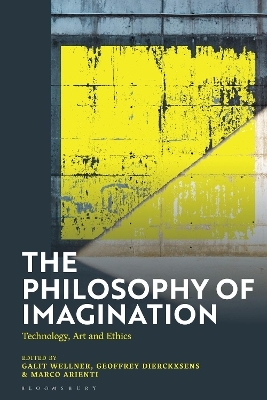
The Philosophy of Imagination
Bloomsbury Academic (Verlag)
978-1-350-27721-2 (ISBN)
Imagination is one of the most significant and broadly examined concepts in contemporary philosophy and is frequently understood as a basic human faculty that enables complex activities. This book shows, however, that imagination is more than a mere enabler. Whilst imagination shapes our experiences, it is at the same time shaped by our environments. Some of the most creative manifestations of imagination are the result of its two-way interaction with art or technology, or both. In short, imagination co-shapes us.
Beyond the traditional perspectives of Kant and Heidegger, The Philosophy of Imagination: Technology, Art and Ethics examines our dynamic relationship with imagination, from contemporary technological advancements such as AI that transform the whole ecosystem to imagination in the context of videogames and literary fiction. Analysing societal imagination, it addresses the relationship between the racial imaginary and white ignorance, as well as the effects that societal mechanisms such as lockdowns can have on our imagination.
Taking its cue from the here and now, this volume brings together leading international scholars to investigate how the concept of co-shaping allows us to see imagination and its crucial role in society in new and productive ways.
Galit Wellner is Senior Lecturer in Philosophy at the NB Haifa School of Design, Israel, and Adjunct Professor of Philosophy at Tel Aviv University, Israel. Geoffrey Dierckxsens is Head of the Interdisciplinary Research Lab for Bioethics (IRLaB) at the Institute of Philosophy of the Czech Academy of Sciences (CAS), Prague, the Czech Republic. Marco Arienti is a Doctoral Researcher in Philosophy at the University of Antwerp, Belgium.
Editors' Introduction, Galit Wellner (Tel Aviv University, Israel), Geoffrey Dierckxsens (Czech Academy of Sciences, Czech Republic) and Marco Arienti (University of Antwerp, Belgium)
Part I: Imagination and Technology
1. Technologically Related Imagination: Postphenomenology and the Art of Dibutades, Lyat Friedman (Bezalel Academy of Arts and Design, Jerusalem)
2. Can Algorithms Imagine?, Galit Wellner (Tel Aviv University, Israel)
3. Emaginary; or Why the Essence of (Digital) Technology is by No Means Entirely Technological, Alberto Romele (Sorbonne Nouvelle University, France)
4. Techno-Activism, Lars Botin (Aalborg University, Denmark)
Part II: Imagination and Ethics
5. White Ignorance and the Racial Imaginary, Celia Edell (University of British Columbia, Canada)
6. Moving In a World You Cannot See: From Imaginative Perception to Creative Moral Imagination, Yanni Ratajczyk (University of Antwerp, Belgium)
7. Narrative and Imagination in Times of Global Pandemics, Geoffrey Dierckxsens (Czech Academy of Sciences, Czech Republic) and Petr Kouba (Czech Academy of Sciences, Czech Republic)
Part III: Imagination and Art
8. Poetic Imagination and Technology: A Dialectical Assessment, Hub Zwart (Erasmus University Rotterdam, Netherlands)
9. Am I in Wonderland as Alice is? The First-Person Perspective in Imaginative Art and Game Experiences, Arthur Cools (University of Antwerp, Belgium)
10. Representation, Expression, Exemplification: Paul Ricoeur, Nelson Goodman, and the Role of Imagination in the Metaphorical Process, Roger W. H. Savage (University of California, USA)
11. Imagination and Images between Phenomenology and Analytic Philosophy, Marco Arienti (University of Antwerp, Belgium)
Part IIII: Imagination, the Human, and the Contemporary World
12. Why Imagination Needs Socratic Ignorance, Cathrine Hasse (Aarhus University, Denmark)
13. Ryle and Sartre against Hume’s Theory of the Imagination, Andreas Vrahimi (University of Cyprus, Cyprus)
14. Enactive Imagination: Its Roots and Contemporary Horizons, Zuzanna Rucin´ska (University of Antwerp, Belgium)
15. Phantasy and Technologically Embedded Imagination: A Phenomenological and Postphenomenological Analysis, Nicola Liberati (Shanghai Jiao Tong University,China)
List of Contributors
Index
| Erscheinungsdatum | 04.06.2024 |
|---|---|
| Verlagsort | London |
| Sprache | englisch |
| Maße | 156 x 234 mm |
| Themenwelt | Geisteswissenschaften ► Philosophie ► Ethik |
| Naturwissenschaften | |
| ISBN-10 | 1-350-27721-5 / 1350277215 |
| ISBN-13 | 978-1-350-27721-2 / 9781350277212 |
| Zustand | Neuware |
| Haben Sie eine Frage zum Produkt? |
aus dem Bereich


